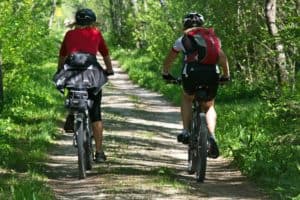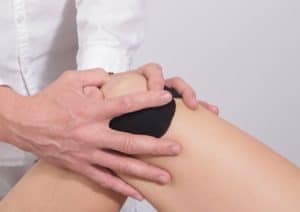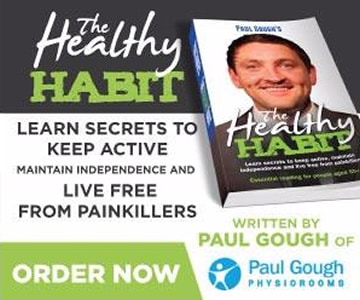Chronic knee pain is something many cyclists suffer from and everyone wants to reduce knee pain when cycling.
It may have started off as a twinge, a slight feeling of discomfort, but that can develop into regular, constant pain that stops you from the enjoyment of cycling – and could even lead to surgery.
Whatever your level of cycling – a weekend social rider, a commuter heading to and from work, member of a local cycling group, or a professional cyclist, remember that knee pain can affect everyone.
But how do you reduce knee pain when cycling?
With the correct and regular measures taken, you can avoid knee pain in cycling and also learn to deal with it if it does happen. It doesn’t have to stop you enjoying your rides in the great outdoors.
If you suffer from cycling knee pain, it can be very debilitating. With the warmer weather upon us and the summer months ahead, now is time to start getting back on the bike, easing your way, and seriously building up your fitness for those longer rides.
Whether you are training for a full day race, or just interested in getting out without your friends on a social level, this can be a problem for the body when the amount of time you spend on the bike increases.
Some people can suffer from knee pain while walking – read our blog to discover some expert advice.
In this blog article we will cover various topics to help you avoid knee pain while cycling:
- Types of knee pain
- How to fix cycling knee pain
- Stretches to avoid knee pain while cycling
- Quick and easy exercises to help avoid knee pain

How the knee is made up
To understand knee pain and its causes, a basic idea of what the knee joint is all about is very useful. To put it simply, think of the knee joint as a hinge where the (quad) muscles pull the knee straight and the hamstring muscles bend the knee.
The quadriceps run from the front of the thigh bone to the knee cap, which in turn acts as a pulley to increase the force generated by quads.
Many years ago, surgeons would often remove the knee cap if it was causing pain from arthritis.
The knee would still function but couldn’t generate as much pushing force. Hamstrings run from the lower point of your pelvic bone (the point that you hopefully sit on while riding) to deep behind the knee on the tibia.
Then the ITB (iliotibial band) runs down the outside of the thigh and blends into the outside of the knee, a common source of trouble for cyclists.
Types of knee pain
The most common type of knee pain in cyclists is often around the knee cap. The pain can be mild or quite debilitating, depending on its severity. It is often, but not always, a result of tight quadriceps, a tight ITB and poor gluteal strength.
How your bike is set up can also play a part, with the seat in the wrong position (too low is a common problem) by causing an increased force between the knee and the thigh bone.
The ITB can also create pain at the front or outside of the knee if it is too tight. This is also a common problem for runners. On occasions the thick band of tendon that runs from the knee cap to the tibia can become unhealthy and degenerated.
However, training volume and changes in training types should be considered as tendons do not respond to change quickly. That means the knee cap can become unhealthy and cause pain at the front of the knee.
How to fix cycling knee pain
Obviously prevention is better than the cure, but how do you keep the knee happy while the volume and intensity of training increases. The conditions are treatable. If caught quickly, treatment time can be reduced significantly.
Physiotherapy is usually effective in treating knee pain so there is no need to be a hero and put up with pain. Treatment will be different for each person, based on an accurate assessment to determine which muscles are tight and which areas are weak.
Massage, soft tissue release and foam rolling can all be effective in reducing muscle tightness in conjunction with a home stretching program. Strength exercises should be part of your routine.
These stretches will help to decrease load on painful structures, improve the health of degenerated structures, or alleviate biomechanical abnormalities. In severe enough cases, physiotherapy can be supplemented with a course of anti-inflammatories as recommended by your GP.

How to prevent cycling knee pain
Firstly, let’s get the bike right because knees are most commonly affected by a seat being too low or too far forward. If this is a problem it may be time to get fitted for bike properly. To keep those achy muscles happy, then stretching routines will help.
Maintaining flexibility is important for injury prevention as tight muscles can lead to overuse injuries.
For cycling related anterior pain (front of the knee) the main muscles to pay attention to will be the quads, hip flexors and glutes.
For recovery purposes then try stretching each muscle group for a minute after each training session. However, during rehab, stretches may need to be done 2-4 times daily.
Stretching for less than 15 seconds is not overly effective as the muscle takes approximately 18 seconds to fully relax. Sometimes during periods of higher training load you will need to stretch more frequently if you start to notice your flexibility decreasing.
While you’re stretching, don’t forget about the rest of the body… there are many other muscles that get tight from riding and they too need a bit of TLC.
Why Saddle Height is important in preventing knee pain when cycling
Riding a saddle that is too high will cause pain in the back and very commonly on the lateral aspect of the knee. That pain is caused by hamstrings or the ITB overextending. Tight hamstrings is a very common trait in cyclists. Calf or Achilles tendon pain is also caused by the foot overextending at the bottom of the pedal stroke.
So if you think your saddle height is too high, make sure it is at the right height for you.
Top 3 stretches to avoid knee pain when cycling
Gluteal Stretch
Bring your knee to your chest, place the same side hand on the outside of your knee. Place your other hand on top of your foot. Pull your foot towards your chest and push your knee across to your opposite shoulder.
Hip Flexor / ITB Stretch
Place a pillow on the floor in front of the chair. Place your toes on the chair and your knee on the pillow. Put your other foot out in front with your knee bent 90 degrees and in line with the knee on the pillow.
Quadriceps Stretch
Stand with your back to the table and place your toes on the table. Place a rolled towel in the crease of your knee. Lean backwards and push your hip forwards.
Quick And Easy At-Home Exercise If You Suffer With Knee Pain When Cycling
Watch our physio George demonstrate a quick and easy at-home exercise that you can do if you suffer with knee pain when cycling. This exercise is very safe for people of all ages, and helps to stretch tight muscles, and loosen stiffen joints which should reduce discomfort behind the knee.
- To start, sit on a chair
- By bending one knee, bring your heel under the chair as far as you can
- Hold the position for one second (you may feel a stretch on the top of your leg)
- Gently straighten your knee with a focus on pointing your toe toward you
- Hold the position for one second (you may feel a stretch on the back of your lower leg, or the back of your knee/upper leg)
- Return to the starting position
- Repeat for 10 repetitions, and do the same for the other leg
If your condition or injury is relative minor, then keeping active, and regularly exercising may be enough to strengthen the muscles surrounding the knee, and avoid the knee becoming stiff and painless.
However, if your condition or injury is more severe and the discomfort is getting worse, you may benefit from some more advanced pain relief techniques, and more specific exercise tailored to your individual needs…
How to Avoid Knee Pain While Cycling Altogether
If you are suffering with regular knee pain, or it is preventing you from cycling freely, then you are probably worrying about what might happen if things continue to get worse…
You may be hoping that things fix themselves, but you are very aware that things are likely to get worse as you age.
If this sounds like you, and you don’t want to feel anxious about the prospect of relying on painkillers, or going into hospital – let alone the currently extremely extended waiting lists, then now is the time to get the support you really need.
At Paul Gough Physio Rooms, we have helped thousands of patients, and helped hundreds of people just like you who are experiencing daily knee pain and unable to move freely.
If you want to get some personalised advice, we offer you the opportunity to speak to a member of our physio team on a 1-1 basis in one of our four clinics…
In this FREE Taster Consultation, we will discuss your knee pain, and identify the underlying cause, as well as outlining what you natural, drug-free solutions are available to you.
Click Here To Arrange Your Free Taster Consultation
Other Free Resources
If you want to read more of our informative blogs, click the link below:
Click Here To Read More Of Our Physiotherapy Blog Articles
Click Here To Read – Can Stress Cause Body Aches And Pains?
Click Here To Read – Prevent Back Pain When Gardening
We also have free, downloadable reports for people with Back Pain, Knee Pain, or Neck And Shoulder Pain
Want videos on demand? Check Out Our YouTube Channel (Remember to hit subscribe so you don’t miss out on our new videos!)

